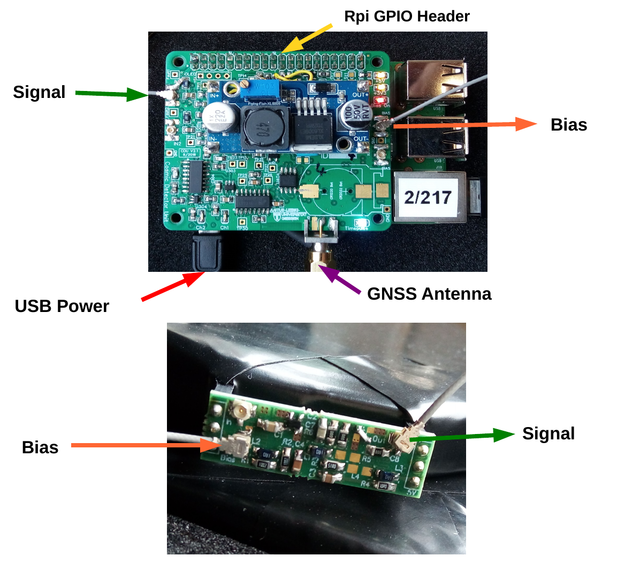Difference between revisions of "Hardware Setup"
m (Phrasing of internal wiki links) |
m (syntax error) |
||
| Line 1: | Line 1: | ||
The MuonPi HAT board is a plug-on board for Raspberry-Pi minicomputers exhibiting a 40-pin GPIO-connector. Only place the board on the RPi with power disconnected. Use 13 mm long plastic spacers and 2.5mm metric screws to fix the board. | The MuonPi HAT board is a plug-on board for Raspberry-Pi minicomputers exhibiting a 40-pin GPIO-connector. Only place the board on the RPi with power disconnected. Use 13 mm long plastic spacers and 2.5mm metric screws to fix the board. | ||
= Cable Connections = | = Cable Connections = | ||
| − | The [[preamplifier]] attached to the [[Silicon_photomultiplier|SiPM]-PCB and the [[Scintillator]] has two connections: One for the provision of the SiPM bias voltage (27...32V for KETEK-type SiPMs) and one for the combined output signal and preamp supply voltage. Both connectors are u.Fl-type coaxial receptacles with the same counterparts on the MuonPi board. They should be connected with standard u.Fl coaxial cables which are widely available (eg. at [https://www.amazon.de/-/en/U-FL-Hirose-Cable-1-13-20/dp/B01MTQGHPM/ref=sr_1_23?dchild=1&keywords=u.fl+kabel+ipx+ipex&qid=1607074316&sr=8-23 Amazon], [https://www.ebay.de/itm/10PCS-IPX-IPEX-u-fl-Female-1-13mm-Connector-Cable-Single-head-Adapter-Connect-QE/303795341801?hash=item46bb9d09e9:g:CpgAAOSw3jxe1erV Ebay] or AliExpress). The connection details are shown in the photograph below. The GNSS antenna is mounted to the SMA jack X7 at the lower edge of the board. Note, that antennas with integrated preamplifier ("active" antennas) are recommended to use in conjunction with the MuonPi board. | + | The [[preamplifier]] attached to the [[Silicon_photomultiplier|SiPM]]-PCB and the [[Scintillator]] has two connections: One for the provision of the SiPM bias voltage (27...32V for KETEK-type SiPMs) and one for the combined output signal and preamp supply voltage. Both connectors are u.Fl-type coaxial receptacles with the same counterparts on the MuonPi board. They should be connected with standard u.Fl coaxial cables which are widely available (eg. at [https://www.amazon.de/-/en/U-FL-Hirose-Cable-1-13-20/dp/B01MTQGHPM/ref=sr_1_23?dchild=1&keywords=u.fl+kabel+ipx+ipex&qid=1607074316&sr=8-23 Amazon], [https://www.ebay.de/itm/10PCS-IPX-IPEX-u-fl-Female-1-13mm-Connector-Cable-Single-head-Adapter-Connect-QE/303795341801?hash=item46bb9d09e9:g:CpgAAOSw3jxe1erV Ebay] or AliExpress). The connection details are shown in the photograph below. The GNSS antenna is mounted to the SMA jack X7 at the lower edge of the board. Note, that antennas with integrated preamplifier ("active" antennas) are recommended to use in conjunction with the MuonPi board. |
[[File:MuonPi-Connections.png|640px|thumb|Hardware connections between MuonPi HAT board and detector]] | [[File:MuonPi-Connections.png|640px|thumb|Hardware connections between MuonPi HAT board and detector]] | ||
Latest revision as of 17:08, 10 December 2020
The MuonPi HAT board is a plug-on board for Raspberry-Pi minicomputers exhibiting a 40-pin GPIO-connector. Only place the board on the RPi with power disconnected. Use 13 mm long plastic spacers and 2.5mm metric screws to fix the board.
Cable Connections
The preamplifier attached to the SiPM-PCB and the Scintillator has two connections: One for the provision of the SiPM bias voltage (27...32V for KETEK-type SiPMs) and one for the combined output signal and preamp supply voltage. Both connectors are u.Fl-type coaxial receptacles with the same counterparts on the MuonPi board. They should be connected with standard u.Fl coaxial cables which are widely available (eg. at Amazon, Ebay or AliExpress). The connection details are shown in the photograph below. The GNSS antenna is mounted to the SMA jack X7 at the lower edge of the board. Note, that antennas with integrated preamplifier ("active" antennas) are recommended to use in conjunction with the MuonPi board.
